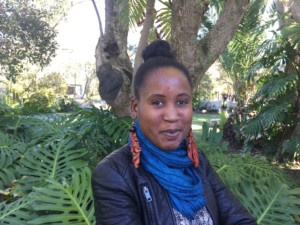
Victoria Tuwilika Shifidi
vtuwilika8@gmail.com
Supervisors: Prof. Reinette (Oonsie) Biggs, Dr. Nadia Sitas, Dr. Joy Waddell
Field of research
- Socio-hydrology
- Transboundary water resources management and governance
- International water law
- Adaptive governance
- Resilience
Profile
Victoria identifies herself as a socio-hydrologist, interested in the dynamic interactions and feedbacks between social and hydrological processes. She completed her 100%-thesis Masters in Geography & Environmental Studies at Stellenbosch University where she investigated the socio-economic consequences of flooding in the transboundary Cuvelai Basin focusing on rural communities of Namibia; an Honors Degree in Geographic Information Systems at Stellenbosch University; and a Science Education Bachelor’s Degree in Biology & Geography from the University of Namibia. She previously worked on arid ecology research projects while based at the Gobabeb Research & Training Centre in the Namib Desert in Namib-Naukluft Park.
Currently, Victoria works for the Namibia Department of Water Affairs & Forestry in the Ministry of Agriculture, Water & Forestry, assigned to hydrological investigations and flood management. She serves the Department on a few transboundary surface water initiatives; represents and reports for the Ministry on the National Climate Change Committee; and serves Namibia on an international Thematic Working Group on Agriculture, Food-Security & Land Use – ‘a country-led peer-to-peer network for countries and international organizations to consult one another and to share experiences and challenges related to climate change impacts and the implementation of the countries Nationally Determined Contributions’ (NDCs) in the AFOLU Sector. The TWG is facilitated by the NDC-Partnership/FAO (http://www.fao.org/climate-change/our-work/what-we-do/ndcs/twg/en/).
Victoria, who spends her free time studying Law, partly pays her ‘societal dues’ by occasionally engaging the public on water action, social and environmental justice, climate change, and governance through her short publications in local dailys or giving part-time university lectures.
She is focusing her PhD on water governance and resilience using the Okavango River Basin as a case study. The work is part of a wider project called ‘Resilient Waters’ supported by USAID Southern Africa and partly aims to build more resilient communities and ecosystems by improving governance of transboundary water resources in the midst of shifting hydroclimatic regimes.

